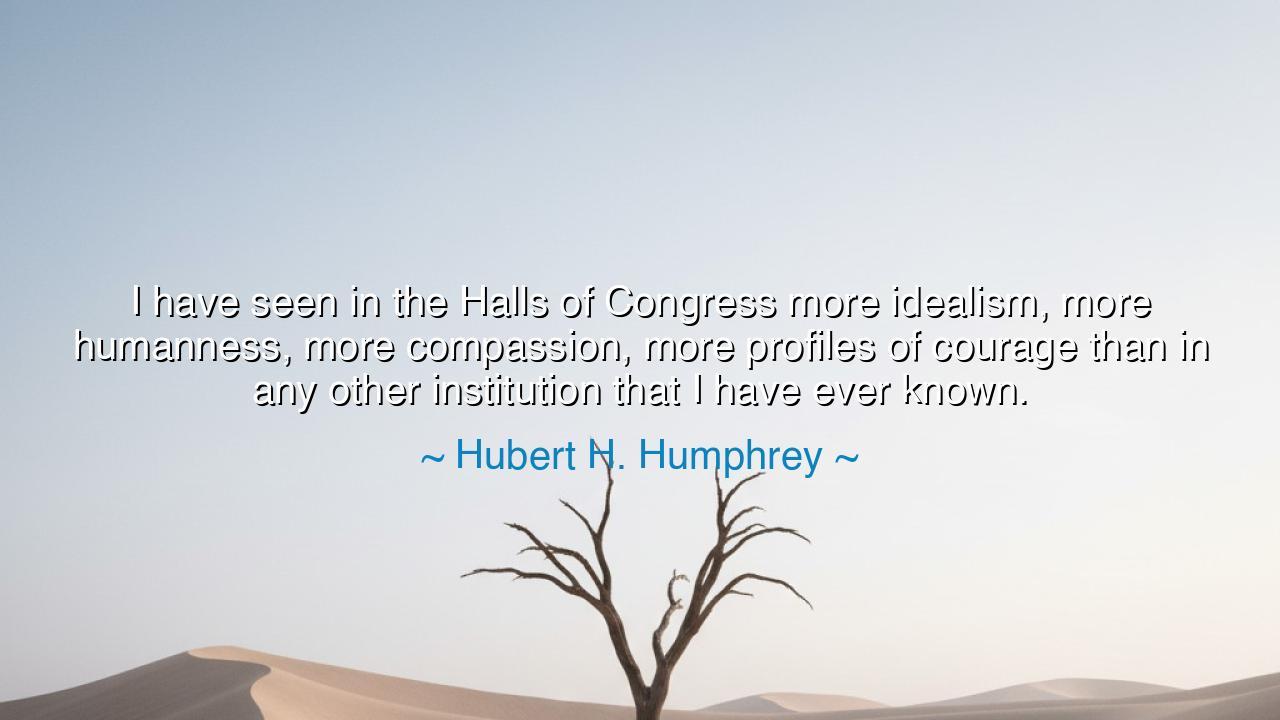
I have seen in the Halls of Congress more idealism, more
I have seen in the Halls of Congress more idealism, more humanness, more compassion, more profiles of courage than in any other institution that I have ever known.






The statesman Hubert H. Humphrey, whose heart burned with faith in democracy, once proclaimed: “I have seen in the Halls of Congress more idealism, more humanness, more compassion, more profiles of courage than in any other institution that I have ever known.” These words, spoken not from naivety but from long labor in the service of the people, remind us that even within the chambers of politics—so often maligned and mistrusted—there beats the living heart of human idealism. Humphrey had walked those halls where ambition and virtue clash like thunder, yet he chose to see not corruption alone, but the light that still burns amid the storm—the courage to do what is right when all winds blow against it.
For Humphrey, who served as Vice President and championed civil rights, these words were not mere flattery; they were born from the witness of years. He had seen men and women rise above fear and self-interest, defying ridicule and defeat, to defend what conscience demanded. In a world quick to scorn the politician, he dared to affirm the humanness within them—the trembling hand that still reaches for justice, the weary spirit that still hopes for a kinder world. His was not the gaze of cynicism, but of reverence: reverence for the soul that strives toward light even in the midst of darkness.
To understand the depth of Humphrey’s claim, one must recall the trials of his time. In the 1948 Democratic National Convention, it was Humphrey himself who stood before the nation and declared that the time had come for America to “walk forthrightly into the bright sunshine of human rights.” His call to include a civil rights plank in his party’s platform provoked outrage among the powerful; delegates stormed out in protest. Yet he did not yield. His courage, reasoned and resolute, lit the path that would lead to the great civil rights victories of later years. Here, then, we see a profile of courage—a man standing firm not because victory was certain, but because conscience commanded it.
Humphrey’s faith in the Halls of Congress was not blind; he knew its flaws, its tempests of pride and greed. But he also saw that within those marble walls, men and women wrestled with questions of morality, justice, and compassion—battles no less fierce than those waged with sword and shield. He saw that even the imperfect could strive toward the ideal, and that the idealism of one brave soul could awaken the sleeping conscience of a nation. Thus his words remind us: greatness does not belong only to saints and heroes, but to those who, in the machinery of government or the grind of daily duty, act with mercy and moral strength.
In the ancient world, the philosopher Marcus Aurelius spoke of ruling the self before ruling others, of leadership born from wisdom and compassion. Humphrey’s vision echoes that stoic truth: that true courage in governance lies not in domination, but in restraint; not in victory over opponents, but in victory over the self. The humanness he praised was not weakness—it was the divine spark that keeps a leader humane when the world would make him hard. To serve others and yet remain kind is the noblest form of strength.
We, the inheritors of these words, must not allow cynicism to cloud our sight. It is easy to scoff at institutions, to see only the rot and not the roots that still nourish the tree. Yet Humphrey calls us to look deeper—to seek the compassion that still moves quietly beneath the noise, to honor those who fight for justice without glory or reward. For every voice that deceives, there are others that defend; for every hand that takes, there are hands that heal.
So let this teaching endure: where men and women gather to shape the fate of others, the measure of greatness is not power, but principle. Be as those whom Humphrey admired—think deeply, act justly, speak bravely. Let your work, whatever your station, be touched by humanness and guided by idealism. For a nation is not ennobled by its wealth or its monuments, but by the courage of its people to love mercy, to do justice, and to walk humbly through the corridors of power. And when future generations walk their own halls—whether of government, of business, or of the human heart—may they, too, see what Humphrey saw: that the light of compassion, though flickering, never dies.






AAdministratorAdministrator
Welcome, honored guests. Please leave a comment, we will respond soon